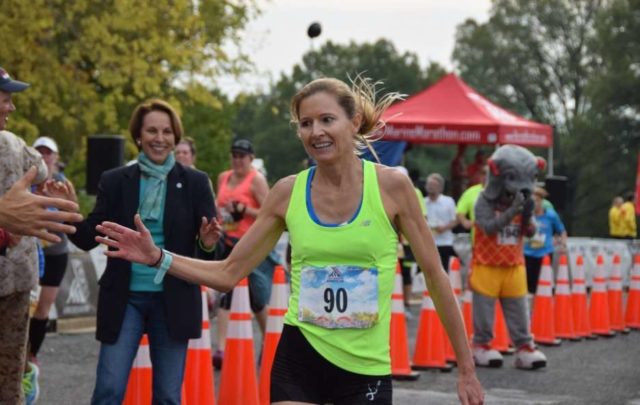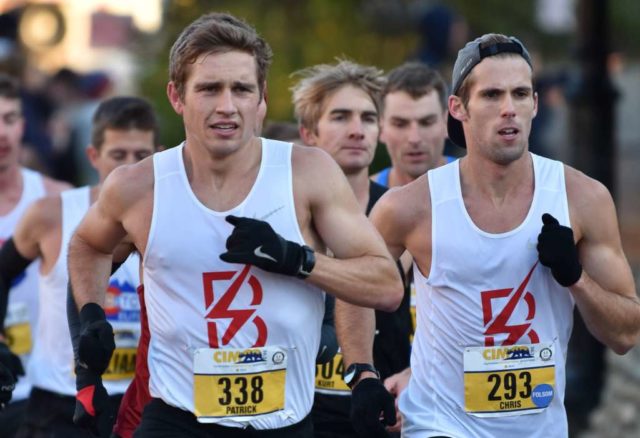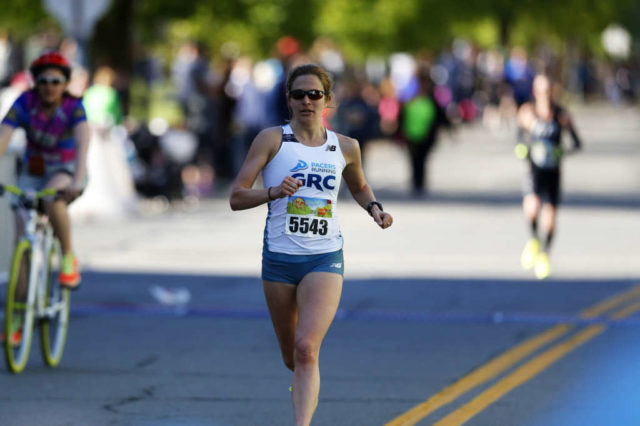
Though she had kept a relatively low profile since winning the 2016 Marine Corps Marathon, Perry Shoemaker is back after qualifying for the 2020 Olympic Marathon Trials April 28 at the Eugene Marathon. Her 2:43:33 was a PR of more than eight minutes.
“I’m still shocked that I did it,” Perry said a little over a week after the race. “And of course I’m still very excited.”
For years, Perry, 48, has challenged the notion that results slow down with age. She says that qualifying for the Trials became a dream when she realized she could do it with the right conditions and without injuries. “Without injuries” turned out to be a key challenge.
Since publication of this article, D’Amato ran 2:34:55 at the 2019 Berlin Marathon and 1:10:01 at the 2020 Houston Half Marathon. She was once again named USATF’s Virginia Long Distance Runner of the Year.
Setting a PR in the 10k seems like it would make most people happy. Especially if they do it at age 34, more than a decade after the conclusion of an All-American running career.
Not Keira D’Amato. She was third at mid-April’s Monument Avenue 10k in Richmond, and she was pissed. Winner Bethany Sachtleben gapped her by almost a minute.
“I got crushed,” she said the next day. “I ran the best I could and I didn’t even last a mile with them.”
She acknowledged the obvious.
“I’m just a competitive person,” she said. “I know I should be happy, it was a lifetime PR (33:37),” she said. “I’m now in better shape than I ever was in college.”

Less than a week ago, Patrick Reaves was on the starting line – and on the list of “Olympic hopefuls” – for an eight-mile race in Atlanta. This was a special event held to preview the course for the U.S. Olympic Marathon Trials, now less than a year away.
Reaves’s result will tell you that he ran 42:14, 5:09 pace, to finish 33rd, and that he lives in Portland, Ore. What it will not tell you is that the 34-year-old runner was actually racing in his hometown, the city where he ran his first marathon as a 19-year-old club runner at the University of Maryland.
Post-race
Reaves sprained his left ankle inthe second mile and ran the rest of the race uncertain of whether it was broken. He finished 140th in 2:30:25.
And while his result indicated — and Reaves himself will confirm it — that a fellow Nike athlete, and three-time national cross country champion, Chris Derrick, tagged along doing a tempo, it will not tell you that Reaves is a professional in the more traditional sense. He’s not paid to run; instead, he’s paid to guide Nike’s social impact strategy, a position that connected him to Bowerman Track Club’s elite corporate team when he and his wife, Valerie, moved to Portland in 2014.
Reaves’s result also will not tell you how he earned the opportunity to be on the starting line: how, in December, at the California International Marathon (CIM), his half marathon split of 1:08:47 was a personal best. He then nearly PRed again, covering the back half only six seconds slower.
This is how Reaves chopped approximately six minutes from his personal best to clock 2:17:40 and beat the sub-2:19 men’s qualifying standard for the trials. Now he’s a year away from competing in the event back in his hometown where his marathon journey began.

D.C.’s Kerry Allen punched her ticket to the U.S. Olympic Marathon Trials in decisive fashion Oct. 7, running 2:41:33 for a seventh place finish at the Twin Cities Marathon in Minneapolis, nearly four minutes faster than the minimum qualifying time of 2 hours, 45 minutes. It makes her the second-fastest full-time female D.C.-area resident to qualify for the 2020 trails, Feb. 29 in Atlanta.
The 30-year-old Senate health policy advisor succeeded after three previous attempts at a qualifying time went sour midway through. Over the two years prior, she was the first (2016) and first-ranked (2017) runner in RunWashington’s rankings, but she hadn’t made it past 16 miles in the New York, Grandma’s or California International marathons without faltering. But Twin Cities was different.

